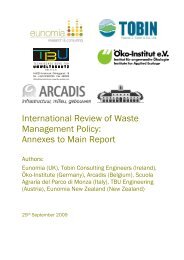Report of the Local Government Efficiency Review Group
Report of the Local Government Efficiency Review Group
Report of the Local Government Efficiency Review Group
You also want an ePaper? Increase the reach of your titles
YUMPU automatically turns print PDFs into web optimized ePapers that Google loves.
10.2.6 To date, <strong>the</strong> emphasis <strong>of</strong> tolling policy has been on <strong>the</strong> public-private<br />
partnerships (PPPs) for national roads (with <strong>the</strong> exceptions being <strong>the</strong> M50<br />
electronic toll and <strong>the</strong> Dublin Port Tunnel). The Eastlink Bridge is an<br />
example <strong>of</strong> a toll scheme on a non-national road. The 9 current PPP toll<br />
projects have raised over €2 billion in <strong>the</strong> period 2006 to 2010. The <strong>Group</strong><br />
believes that <strong>the</strong>re is scope for raising fur<strong>the</strong>r revenue for investment in<br />
national, regional and local roads by introducing new tolling schemes on<br />
national roads (both new and existing), based on an equitable distribution <strong>of</strong><br />
tolling points across <strong>the</strong> national roads network and to broaden <strong>the</strong> base <strong>of</strong><br />
tolling revenue across a greater number <strong>of</strong> road users. The <strong>Group</strong><br />
understands that <strong>the</strong> extension <strong>of</strong> tolling is currently under consideration by<br />
<strong>Government</strong>. It is difficult to quantify <strong>the</strong> possible revenue until an NRA<br />
(National Roads Authority) scoping study that is currently underway is<br />
completed and a <strong>Government</strong> decision is made. Depending on traffic<br />
volumes, and <strong>the</strong> particular tolling schemes chosen, it might in <strong>the</strong> medium<br />
term raise in <strong>the</strong> region <strong>of</strong> €50-100 million gross for investment in road<br />
improvements and maintenance. Following <strong>Government</strong> approval in<br />
principle and completion <strong>of</strong> <strong>the</strong> preparatory studies, <strong>the</strong> <strong>Group</strong> understands<br />
that <strong>the</strong>re is an average lead-in time <strong>of</strong> 12-20 months for tolling schemes on<br />
existing roads, allowing for design <strong>of</strong> <strong>the</strong> tolling system, public consultation,<br />
and statutory approval. For a toll on a new road, <strong>the</strong> road construction<br />
timetable will be <strong>the</strong> determining factor.<br />
10.2.7 The <strong>Group</strong> took note <strong>of</strong> some <strong>of</strong> <strong>the</strong> proposals (such as <strong>the</strong> DTO’s Greater<br />
Dublin Area Travel Demand Management study) on congestion charging as<br />
a means <strong>of</strong> promoting a more responsible use <strong>of</strong> road capacity and to<br />
encourage modal shifts to o<strong>the</strong>r forms <strong>of</strong> transport. Congestion charging is<br />
a logical ‘next step’ to tolling and encouraging moves from private vehicles<br />
to public transport. While this is a longer term project, it is in line with<br />
promoting a greater shift to public transport.<br />
10.2.8 An important support to <strong>the</strong> roads-related work <strong>of</strong> local authorities comes<br />
from <strong>the</strong> 11 Regional Design Offices (RDOs) located in Cork, Limerick,<br />
Kerry, Kildare, Waterford, Donegal, Galway, Mayo, Meath, Roscommon and<br />
Westmeath. These <strong>of</strong>fices are staffed largely by local authority personnel,<br />
funded by <strong>the</strong> NRA, and established to support <strong>the</strong> NRA and local<br />
authorities in <strong>the</strong>ir joint efforts to deliver <strong>the</strong> national roads programme.<br />
Some RDOs support individual counties, while o<strong>the</strong>rs support several<br />
counties.<br />
10.2.9 The RDOs have been engaged primarily in managing major national road<br />
projects through planning, and in <strong>the</strong> case <strong>of</strong> non-PPP projects, through<br />
construction. The <strong>Group</strong> consider that this specialised support role should<br />
be extended to o<strong>the</strong>r aspects <strong>of</strong> <strong>the</strong> roads function, including <strong>the</strong><br />
management <strong>of</strong> non-PPP major projects, strategic regional road projects,<br />
asset and network management and rehabilitation work. In light <strong>of</strong> <strong>the</strong><br />
reducing number <strong>of</strong> major roads projects, this additional workload could be<br />
accommodated within existing staff complements, while also having <strong>the</strong><br />
effect <strong>of</strong> freeing up local authority staff for o<strong>the</strong>r duties. Apart from <strong>the</strong><br />
119
















